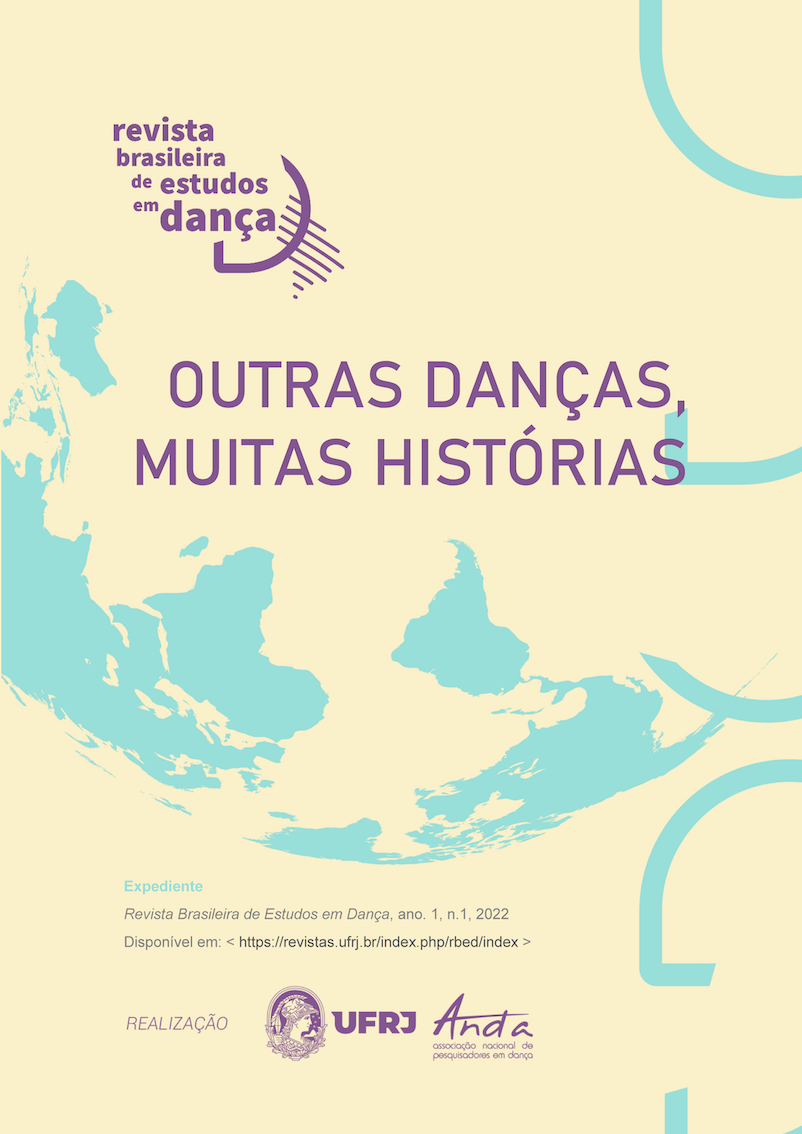Histories and historiographies of Dance:
Problematizing teaching and curriculum proposal at the university
DOI:
https://doi.org/10.58786/rbed.2022.v1.n1.52363Keywords:
History, Dance, Formation, TeachingAbstract
This article arises from the shares obtained at the II International Seminar on History(ies) of Dance(s), held in December 2020, in remote format. The seminar addressed the theme “What are the specificities of thinking and making historiographies in dance in places that went through the colonial process as colonies?” The reflections here focus more on questions than on answers, especially those that may seem hermetic and absolute truths. The problems that I will point out call into question the training curricula and seek to problematize the teaching of dance history, especially in a Dance Degree course at a Brazilian federal university. This essay carries intersections that are the result of relationships and dialogues established throughout my academic trajectory, therefore, it is part of the praxis that has been building in the wanderings of my dancing path, observing these trajectories as a “process of articulation between subalterns” (SPIVAK, 2010).
References
ARAÚJO, Olga Brigitte Oliva. PURPER, Raquel. Pensarfazer Dança desde uma perspectiva contemporânea e Decolonial. Revista Arte da Cena. V.6, n.2, Ago-dez/2020. Disponível em < https://www.revistas.ufg.br/artce/article/view/65655> acesso em set/ 2021.
ARROYO, Miguel G. Currículo, território em disputa. Petrópolis, RJ: Vozes, 2013.
BONDÍA, Jorge Larrosa. Notas sobre a experiência e o saber de experiência. Revista Brasileira de Educação. Jan/Fev/Mar/Abr 2002 Nº 19. Disponível em < https://www.scielo.br/j/rbedu/a/Ycc5QDzZKcYVspCNspZVDxC/?format=pdf&lang=pt> acesso em julho/2020.
BOURDIEU, Pierre. O poder simbólico. Rio de Janeiro: Bertrand Brasil, 2010.
CORTELLA, Mário Sérgio. A escola e o conhecimento: fundamentos epistemológicos e políticos. São Paulo, Cortez, 2011.
COSTA, Joaze Bernardino. TORRES, Nelson Maldonato. GROSFOGUEL, Rámon. Decolonialidade e pensamento afrodisapórico. Belo Horizonte: Autêntica Editora, 2019.
EARP, Helenita Sá. Fundamentos da Dança. Disponível em < https://www.helenitasaearp.com.br/fundamentos-da-danca> acesso em: dezembro 2021.
FREIRE, Paulo. Educação e mudança. 2.ª ed. Rio de Janeiro: Paz e Terra, 1998.
FREIRE, Paulo. Pedagogia da autonomia: saberes necessários à prática educativa. São Paulo: Paz e Terra, 2017.
GOMES, Nilma Lino. RAÇA E EDUCAÇÃO INFANTIL: À PROCURA DE JUSTIÇA. Revista e-Curriculum, São Paulo, v.17, n.3, p.1015-1044jul./set. 2019. Disponível em < https://revistas.pucsp.br/index.php/curriculum/article/view/44232/29876> acesso em setembro/2021.
GOMES. Nilma Lino. O movimento negro e a intelectualidade negra descolonizando os currículos. In: COSTA, Joaze Bernardino. TORRES, Nelson Maldonato. GROSFOGUEL, Rámon. Decolonialidade e pensamento afrodisapórico. Belo Horizonte: Autêntica Editora, 2019.
GUARATO, Rafael. Historiografia da dança: teorias e métodos. São Paulo: Annablume, 2018.
JACINTO, Daniela. Criador da Pedagogia Histórico-Crítica fala sobre o papel da escola. Jornal Cruzeiro do Sul. 13/03/2014. Disponível em < https://www2.jornalcruzeiro.com.br/materia/536125/criador-da-pedagogia-historico-critica-fala-sobre-o-papel-da-escola> acesso em novembro/2021.
MIGNOLO, Walter D. Desobediência epistêmica: a opção descolonial e o significado de identidade em política. Cadernos de Letras da UFF – Dossiê: Literatura, língua e identidade, no 34, p. 287-324, 2008.
NHUR, Andréia. Historiografia dançada: escritas memoriais a partir da dança do cisne. In: GUARATO, Rafael. Historiografia da Dança: Teorias e Métodos.1 ed.São Paulo: Annablume, 2018
NÓVOA, António, FORMAÇÃO DE PROFESSORES E PROFISSÃO DOCENTE. In: Os professores e a sua formação. Lisboa : Dom Quixote, 1992.
O’SHEA, Janet. Decolonizar o currículo? Possibilidades para desestabilizar a formação em performance. Revista Brasileira de Estudos da Presença. Porto Alegre, v.8, n.4. Acesso em < https://www.scielo.br/j/rbep/a/jqkjFQLxkzkQ94Czg9dHtKN/?lang=pt&format=pdf> acesso em setembro/2021
POLLAK, Michael. Memória, Esquecimento, Silêncio. Estudos Históricos. Rio de Janeiro: v.2,
QUIJANO, Anibal. A colonialidade do poder, eurocentrismo e América Latina. CLACSO, Consejo Latinoamericano de Ciencias Sociales. Buenos Aires, 2005. Disponível em < http://bibliotecavirtual.clacso.org.ar/clacso/sur-sur/20100624103322/12_Quijano.pdf> acesso em outubro/2021
RIBEIRO, Darcy. Sobre o óbvio. Rio de Janeiro: Guanabara, 1986.
SAVIANI, Demerval. A pedagogia no Brasil – história e teoria. Campinas, SP: Autores Associados, 2012.
SPIVAK, Gayatri Chakravorty. Pode o subalterno falar? Editora UFMG: Belo Horizonte, 2010.
TAMBUTTI, Susana. GIGENA, Maria Martha. Memórias do presente, ficções do passado. In: GUARATO, Rafael. Historiografia da Dança: Teorias e Métodos.1 ed.São Paulo: Annablume, 2018
WILCOX, Emily. Quando os lugares importam: provincializando o “global” / When places matter: provincializing the global. In: Rethinking Dance History, Vol. 2, Routledge 2018. Tradução de Rafael Guarato.
Downloads
Published
Versions
- 2024-05-10 (5)
- 2023-12-01 (4)
- 2023-11-30 (3)
- 2023-11-30 (2)
- 2022-07-15 (1)
How to Cite
Issue
Section
License
Authors who publish in the Revista Brasileira de Estudos em Dança are
responsible for the content of signed articles and retain copyright.
They grant the journal the right of first publication with the work simultaneously
licensed under the Creative Commons Attribution-NonCommercial 4.0 License
(Open Archives Initiative - OAI). This feature, used for open-access journals,
allows sharing work for non-commercial purposes and acknowledges
authorship. If the text is later published in another vehicle, the author
must inform that it was initially published as an article in the Revista Brasileira
de Estudos em Dança. Therefore, even if the journal owns the first publication,
authors are entitled to publish their work in institutional repositories or on
their personal pages, even if the editorial process has not been completed.
The journal reserves the right to make normative, orthographic, and grammatical changes to maintain the language standard, respecting the authorial style.

